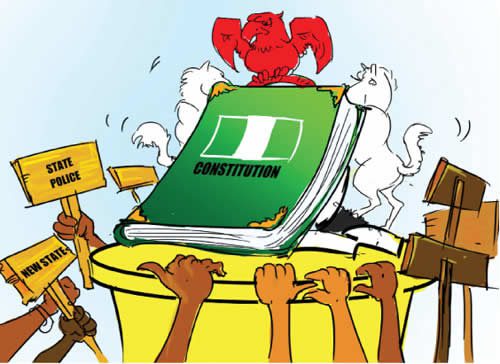Democracy & Governance
Nigeria: The Sick State Shunning Salvation -By Tope Oke

Like many of her African sisters, Nigeria is a creation of European imperialism. Its name – after the Niger River was suggested by Flora Shaw, a British journalist who later became the spouse of the Head of the colonial government, Frederick Lugard. In a bid to ease his administrative work over both sides and more crucially, to use the proceeds of the buoyant South to bankroll the less prosperous North, he decided to amalgamate both sides in 1914. It was essentially a marriage consummated for economic reasons and convenience. In fact, as Lugard himself put it, “rich wife of substance and means” (south) and the “poor husband” (the north) would lead to a happy life for both”. Clearly, not in theory or in reality can this arrangement work – and it hasn’t.
While Lugard’s haphazard conception is clearly the genesis of the present uneasy union, the failure of the Nigerian state itself to rework or rejig it, despite often recognizing the strained marriage bears significance. Of course, there’s been a couple of attempts to secede. The two most prominent being Operation Araba – the brutal northern counter coup that was the consequence of Ironsi’s infamous Decree 34 – the swapping of regionalism with a unitary system. From then on, the marriage was effectively sealed after the British persuaded the soldiers to maintain the status quo. In Ojukwu’s words it became a case of “locked together and there you will stay”. Nigeria’s unity became non-negotiable – a rhetoric often amplified by most of those who were active on that night of July 29, 1966 and their cohorts. The attempt by the East to toe the same path was brutally crushed and any attempt at secession has been resisted.
Many years after Lugard’s marriage of convenience, the regional economic disparity and asymmetrical political structure still persists, giving room for the series of endless agitation for restructuring all over the country today. If Nigeria’s unity is non-negotiable, we can at least determine how we co-habit. The present structure as evidenced, has only promoted misgovernance and left the country in an economic mess. It only serves the interest of the elitist few who are only keen to access and control power and political merchandise at the detriment of the majority. The polity is anchored on unsustainable injustice that the current design fosters.
Like a car that requires a new engine, the country requires a new constitution – the document that was cut and sewn by the military for civilians in 1999. It is like wearing a garment designed by a carpenter. While we often criticize the British for the forced marriage, they at least bequeathed a constitution that seemed to accommodate the major interest groups. Power was devolved from the center to the regions and everyone decided when to arise and when to sleep. However, the incursion of the military into political life has ultimately brought us to where we are today.
A gradual shift from Westminster to Washington happened, albeit, rendering the “We the People” phrase in the promulgated constitution meaningless. The phrase assumes there is unison amongst most of the citizens in the way they want to live together. A shared purpose and future. An identical national consciousness. So, it is in this context that Nigerians are victims of a double jeopardy. Compelled to live in a forced marriage and worse still have a constitution foisted on it by the jackboots. Drafted in secret by a few men led by a Professor Yadudu, the 1999 document was simply decreed into law by General Abubakar with no considerations given to the input or the wishes and aspirations of Nigerians. The numerous ambiguities and contradictory principles inherent in the document has served to create more chaos and confusion in the system. For instance, while it recognizes state governors as the chief security officers of their states, it excludes them from effective control of the police. It gives the same governors custodial powers over the land in their domain, yet says whatever is underneath belongs to the center. Federal in name but unitary in reality, it confers so much powers in Abuja that most states cannot breathe without it. This concentration of power in the center is central to the reasons why there has been little or no progress in many areas that have to scale the bureaucracy of government to move forward. The symmetrical development that is the hallmark of a true federalist state is piercingly absent.
As you cannot force a horse to drink water at a stream, so also a constitution cannot be forced down the throat of a people. In every social group, people codify how they want to relate and associate with one another. What actually binds people together isn’t the thread of the constitution but shared beliefs and ideas. While we have striven to copy the American style of government, the only thing similar between both systems is the sheeny white coat of paint at both seats of power. Outside of the villa and Abuja, is a country descending into darkness as the social dissatisfaction and disintegration – a consequence of the lopsided structural imbalance of a flawed constitution and the hegemonic and patrimonial it has created conflagrates. The superficial amendments made will only address superficial issues. Nigeria requires a total overhaul of her corporate structure to reflect the yearnings of its citizens. If the government is reluctant to commission a constituent assembly or referendum, the 2014 Conference Report contains salient recommendations that could change the trajectory of the journey to implosion. While it may not be a flawless document, it could engineer and drive the restructuring of the country into a genuine federal frame.
Tope Oke is a writer and public affairs analyst.
@teepenn44









